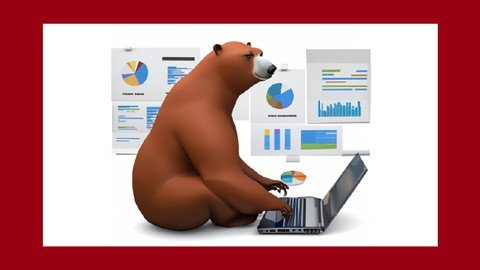
Published 12/2023
MP4 | Video: h264, 1920×1080 | Audio: AAC, 44.1 KHz
Language: English | Size: 991.39 MB | Duration: 3h 12m
Master Essential Patterns for Data Manipulation in Polars
What you’ll learn
You’ll learn how to answer data questions from real-world datasets.
You’ll learn how to create beautiful visualizations with code.
You’ll learn how to write easy-to-read code that can be re-used to save time.
You’ll learn how to approach different data questions from a variety of datasets.
Requirements
No requirements.
Description
DescriptionData science and analysis is all about asking questions about your data. This course is deliberately designed for that purpose. We’ll be answering a variety of questions based on three real-world datasets. You’ll learn effective patterns for data manipulation and how to write easy-to-read code that can be re-used. To do the analysis, we’ll use Polars, a blazingly fast DataFrame library for Python that enables you to handle large datasets effortlessly. Additionally, you’ll learn how to create beautiful visualizations to effectively communicate the message of your analysis.Real-world DatasetsThis course uses three real-world datasets: 1) IMDB Movies, 2) YouTube Comments, 3) Stack Overflow Survey. You will tackle a variety of questions related to these datasets, employing diverse approaches to extract meaningful information. From statistical analysis to data visualization, you will develop a versatile skill set that will empower you to address complex data-related inquiries. This hands-on experience with real-world datasets will not only enhance your technical proficiency but also prepare you for the multifaceted challenges that arise in the world of data science and analysis.Beautiful VisualizationsYou will learn how to create visually appealing charts using code, enabling you to adeptly convey the insights derived from your analysis. The focus is on the art and science of designing compelling visuals that effectively communicate the intended message, enhancing your ability to present and share your analytical findings in a clear and impactful manner.
Overview
Section 1: Introduction
Lecture 1 Welcome to The Course
Lecture 2 About The Instructor
Section 2: IMDB Movies
Lecture 3 Load The Dataset
Lecture 4 Duration Question 1
Lecture 5 Duration Question 2
Lecture 6 Budget Question 1
Lecture 7 Budget Question 2
Lecture 8 Release Date Question 1
Lecture 9 Release Date Question 2
Lecture 10 Release Date Question 3
Lecture 11 Release Date Question 4
Lecture 12 Revenue Question 1
Lecture 13 Revenue Question 2
Lecture 14 Revenue Question 3
Lecture 15 Revenue Question 4
Lecture 16 Directors Question 1
Lecture 17 Directors Question 2
Lecture 18 Genres Question 1
Lecture 19 Genres Question 2
Lecture 20 Genres Question 3
Lecture 21 Genres Question 4
Lecture 22 Titles Question 1
Lecture 23 Titles Question 2
Lecture 24 Titles Question 3
Lecture 25 Language Question 1
Lecture 26 Language Question 2
Lecture 27 Language Question 3
Lecture 28 Popularity Question 1
Lecture 29 Popularity Question 2
Lecture 30 Popularity Question 3
Lecture 31 Cast Question 1
Lecture 32 Cast Question 2
Lecture 33 My Favorite Movie Question 1
Lecture 34 My Favorite Movie Question 2
Lecture 35 My Favorite Movie Question 3
Lecture 36 My Favorite Movie Question 4
Lecture 37 My Favorite Movie Question 5
Lecture 38 My Favorite Movie Question 6
Lecture 39 My Favorite Movie Question 7
Lecture 40 My Favorite Movie Question 8
Lecture 41 My Favorite Movie Question 9
Section 3: YouTube Comments
Lecture 42 Load The Dataset
Lecture 43 Comments Question 1
Lecture 44 Comments Question 2
Lecture 45 Comments Question 3
Lecture 46 Comments Question 4
Lecture 47 Comments Question 5
Lecture 48 Likes Question 1
Lecture 49 Likes Question 2
Lecture 50 Likes Question 3
Lecture 51 Likes Question 4
Lecture 52 Time Question 1
Lecture 53 Time Question 2
Lecture 54 Time Question 3
Lecture 55 Time Question 4
Lecture 56 Reply Question 1
Lecture 57 Reply Question 2
Lecture 58 Reply Question 3
Lecture 59 Reply Question 4
Lecture 60 Reply Question 5
Lecture 61 Reply Question 6
Lecture 62 Beautiful Bar Plot
Section 4: Stack Overflow Survey
Lecture 63 Load The Dataset
Lecture 64 Profession Question 1
Lecture 65 Profession Question 2
Lecture 66 Profession Question 3
Lecture 67 Profession Question 4
Lecture 68 Profession Question 5
Lecture 69 Salary Question 1
Lecture 70 Salary Question 2
Lecture 71 Salary Question 3
Lecture 72 Salary Question 4
Lecture 73 Salary Question 5
Lecture 74 Age Question 1
Lecture 75 Age Question 2
Lecture 76 Age Question 3
Lecture 77 Age Question 4
Lecture 78 Programming Languages Question 1
Lecture 79 Programming Languages Question 2
Lecture 80 Programming Languages Question 3
Lecture 81 Programming Languages Question 4
Lecture 82 Programming Languages Question 5
Lecture 83 Country Question 1
Lecture 84 Country Question 2
Lecture 85 Country Question 3
Lecture 86 Country Question 4
Lecture 87 Country Question 5
Lecture 88 Country Question 6
Lecture 89 Country Question 7
Lecture 90 Developer Type Question 1
Lecture 91 Developer Type Question 2
Lecture 92 Developer Type Question 3
Lecture 93 Developer Type Question 4
Lecture 94 Developer Type Question 5
Lecture 95 Beautiful Pie Chart – Data Prepping
Lecture 96 Beautiful Pie Chart – Completed
Section 5: Conclusion
Lecture 97 Congratulations on Finishing!
This course is for data professionals who want to learn how to answer different data questions efficiently.
Password/解压密码www.tbtos.com
转载请注明:0daytown » Answering Data Questions With Polars In Python